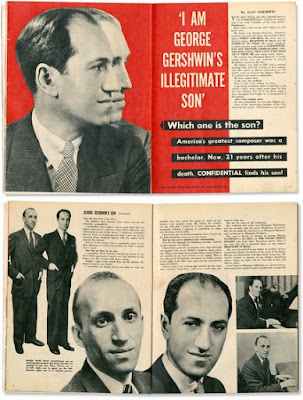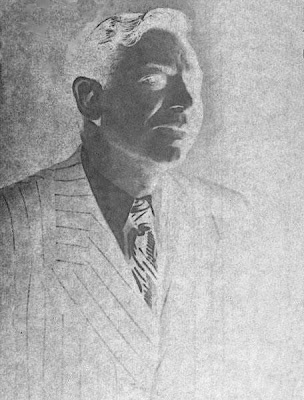George #1: dredged out of rare archival footage, in turn dredged up by documentarians. Here we see the godlike, melancholy Gershwin portraits come to life. The guy looks like Basil Rathbone on the surface of things. The pipe, the regal bearing. I assume he's either courtside or At Home, or at the home of some bigwig like Schoenberg.
George #2. This one reveals so much: the godlike creature casually stretching, the playfully rough character grabbing the neck of some poor unfortunate female (who doesn't look too happy about it), the jauntily histrionic piano-playing with whoever-it-is. Not Oscar Levant, we know that much.
When you keep seeing the same 10 or 15 seconds played over and over again, it either drives you crazy or helps you see more and more in these tiny moments, these gestures, the setting of what looks like director's chairs in front of a massive, flat-trimmed hedge. This really happened, it did, and it spins on your hand, a few seconds of reality played over and over as no one ever dreamed it could be.
George #3. This might be Schoenberg, but then again, I think S. was older than this at the time (early '30s?). Whoever it is, they're playing piano four hands, and goofing around facing the camera like little kids.
George #4. The long and lanky man with the bearing of royalty Walks Out on the Patio, jerks a treat away from the dog, unfolds a chaise.
George #5, my least-favorite, but perhaps the most revealing. When the dog, which he has already deprived of a treat, won't jump up on the chaise with him (reminding me of Hitler's cowering Blondi), he jerks it up forcefully by the scruff as it resists him with a flinch. I am reminded of a magician yanking a rabbit out of a hat.
George #6: again, in slow, and fade to black.
Given how world-famous he was, why don't we have more archival footage of Gershwin performing? The last gif (below) of GG racing through I Got Rhythm and bowing like a jerky puppet was all I found, and it was described as "extremely rare". He lived until 1938, for God's sake. This wasn't the Stone Age. By that time Oscar Levant (usually seen as a much lesser light) had a solid career as a composer and pianist, and had already written a book and appeared in a couple of movies. Where was George?
And after that, a fade to nothingness. A brain tumour carried him off, horribly, at age 37. His life sprang wildly out of shape, his behaviour became crazed, he smeared chocolate all over himself (though he was surely not the first - or last - to do that; it was just that no one expected George Gershwin to do it. My theory is that he was making himself up in blackface, and missed.)
His sister-in-law Lee Gershwin had a hate on for George, and as he fell out of his chair in restaurants and endured agonizing headaches, she pushed him away in disgust, banishing him from friends and family. It was all psychosomatic, you see, a result of the strain of being a Great Composer. Never did anyone think to look under the hood, where a golf-ball-sized malignant tumor was destroying his temporal lobe. By the time they looked, it was too late, there was nothing they could do. His temperature shot up to 106.5 degrees, and he soon died, going up in flame hotter than the fires of his genius.
I have only barely begun to touch Gershwin, though like most afficionados I used to think I knew him pretty well. I am becoming fascinated now (oh boy, look out, here comes another obsession that will take up a couple dozen posts!) as I wait for a bio I ordered from Amazon. Not the 900-page one - I'm waiting to see if the shorter one whets my appetite for more, or puts me off. I bogged down in two massive Twain biographies when it all got to be too much.
I always felt GG was snobby, cool, asexual, full of himself, if vital and driven and full of energy. The music always struck me as a bit crazy, and sometimes excruciatingly beautiful. It was as if the composer and the rest of George were two beings. His death was just plain godawfully horrible, no one deserves to die like that, exiled even from one's own mind. So what was going on there, were things just burning too hot to carry on in in any state of health?
More will be revealed.
APPENDA (UM, IX). I remembered a story from maybe 40 years ago, when my brother Walt, a professional musician, told it to me. At the time I thought, oh, this is what musicians talk about around the water cooler or at the bar or wherever. But it's a damn good story, and as usual I wondered if I dreamed it. I looked it up, and, yes, here it is! I found several versions of it (in fact I just deleted one that stunk), but I like this one best, embedded in a story in the Wall Street Journal. There are various versions, of course - and sometimes the teller is actually in the car with Gershwin, or even driving it. If it never happened, then perhaps it should have.

Throughout his brief life—he died in 1937 at age 38—Gershwin had the golden touch. The phenomenon of George Gershwin astonished everyone—not least Gershwin himself. He was famous for his immodesty, except that in him it came off as something else, self-amazement perhaps. "You know the extraordinary thing about my mother," he once said, "she's so modest about me." When a friend in Hollywood was driving wildly, Gershwin alerted him: "Careful, man, you have Gershwin in the car." Listening for the first time to a full orchestral rendering of the opera "Porgy and Bess," he exclaimed: "This music is so wonderful, so beautiful that I can hardly believe I wrote it."
Not F. Scott Fitzgerald but George Gershwin may have been the reigning figure of the Jazz Age. Gershwin holding forth at the piano at parties in Manhattan, everyone gathered around as if by magnetic force—these scenes were among the symbolic tableaux of the 1920s. Samuel Behrman, the playwright and memoirist, described his reaction when he first heard Gershwin at one such party: "I felt on the instant, when he sat down to play, the newness, the humor, above all the great heady surf of vitality. The room became freshly oxygenated; everybody felt it, everybody breathed it."
Visit Margaret's Amazon Author Page!
































.jpg)
.jpg)






















